In Panicle, Gillian Sze doesn’t write, she snaps – the way a photographer would – the fog as it becomes “merino wool.” She paints a woman pressing her lips to her compact mirror, depicting “the lines around her mouth.” Like a collage of stunning Instagram images, her poems breathe beauty; they are instantaneous snippets in time, right before something else is about to happen, before someone shifts spots, a new scent traverses the room. Reading her is like accompanying a curator through a phenomenal new exhibit: she shows us things that at first glance we might miss. She takes us where “the smell of winter at night has the same crisp scent as the sound of the word biscuit.” She listens: to noises, words, utterances. Rich and dense, her lines offer us so much of her.
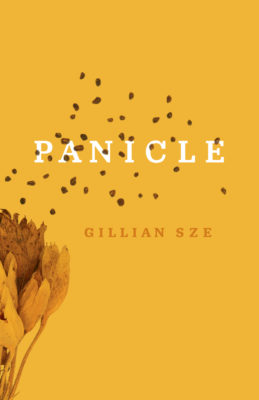
Panicle
Gillian Sze
ECW Press
$18.95
paper
90pp
9781770414051
She is at her finest when ekphrastic, when interacting with German von Bohn, Hans Makart, and Théodore Chassériau in “Musées Royaux des Beaux-arts de Belgique.” Or, in “Discourse Between Stockings,” when she concocts a relationship out of Betty Goodwin’s Stockings. She probes into everything black in the third section, “Guillemets” (or quotation marks), a response to Pouvoir du noir (1966) by Roland Giguère that also includes sketches by Jessica Hiemstra.
Delicateness haunts Panicle; its lines land, like a beautiful black butterfly, on your skin.
When I close Sze’s book, a meditative feeling overcomes me, a deep exhale. My breathing has slowed; my heartbeat is quieter, as if I’ve spent the day relaxing under a tree in the park.
Rebecca Păpucaru’s debut The Panic Room quivers, ablaze with striking collocations of thoughts and things:
At lunch time
I find doll parts in the microwave:
a measuring cup of fondued limbs, one
hand gripping the glass lip; a head, crying
its features off to a soft, hairless apricot.
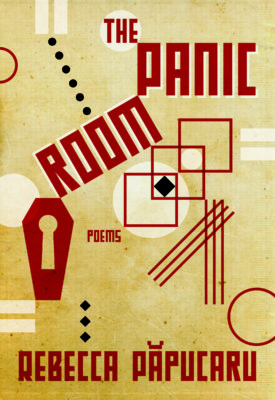
The Panic Room
Rebecca Pǎpucaru
Nightwood Editions
$18.95
paper
96pp
9780889713383
Words take centre stage in “Group Therapy”:
Orange is legit.
Pierced by cloves, a Saint Sebastian sacrificedto a fomenting stock. A kitchen Molotov cocktail.
In the end, a mystic aura escapes the poem as the persona takes her word home, plays hangman with it.
Păpucaru is sturdiest when she cuts our consciousness short, diverts expectation into new-found grounds for thinking; when she hits one word with the next, collapsing our hope about what is to come. Narrations are erratic beings.
This first collection sends shock waves on a scale all its own; it agitates the line as we know it. Păpucaru is in tune with the hallucinations of histories, the shaky pasts of Eastern European Jews. The guitar is electric, the strings are made of steel, and she absolutely rocks it.
To close The Panic Room is to come out a little stirred and high on adrenaline.
Trish Salah’s collection Lyric Sexology disorders the tradition of naming. It questions our labelling of trans, the sexual, the unseen and unsaid. And does it all through the lyric.
If the book reads a bit like a play at first, it’s because the persona is right there, talking directly at us. Buckle up, it starts fast. Sit tight, because it drives wild and doesn’t break at the virage. It also switches lanes really fast, and riffs off many texts, as she says in the works cited – texts on feminism, psychoanalysis, and transgender studies, to name a few.
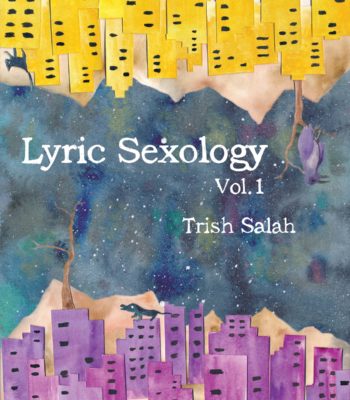
Lyric Sexology
Vol. 1
Trish Salah
Metonymy Press
$19.95
paper
184pp
9780994047144
She gets straight to the point in the third lyric of the first chapter with her “introduction to this book,” her lyrical sexology:
I am not any of those things you have words for now. You don’t have words for what I am. What I was was this:
I was a dude.
Then I was a chick.
Then I was a dude again.
How do you baptize a body that is a s/he? What name will you give it?
Salah is most touching in poems like “The Count” and “Teenage Trans Vamp Montreal, Fall 1987,” where narration takes over, slows down, the story imbued with flesh and form. Where we ache for the persona. Hers is another book that needs to be performed, embodied – shouted from a stage. I would be curious to hear it played out by an actor.
When you step out of this collection, your head spins slightly, but you know the ride was necessary. The subject matter is vital to our understanding of non-linear identity.
Sennah Yee’s debut collection How Do I Look? riffs off popular films and TV series (from Lost in Translation to Gilmore Girls), questions gender, plays with social and digital conundrums, and takes us to racial incidents in cities like Bruges, Berlin, and New York. Seizing grander notions of gender, sexuality, race, and cultural identity (to name a few), Yee locks them into user-friendly, crisp blocks of text. She successfully unties knotty social topics and presents them as short, everyday life snippets. We’re never preached to, simply told.
Even if it’s labelled poetry – a poetry that can best be described as Seidel meets Bashō, meets an Instapoet – the book reads like a memoir at times, a well-crafted diary, at others. Whatever is fictional about it, it reads as eerily real, which makes it beautiful, often painful.
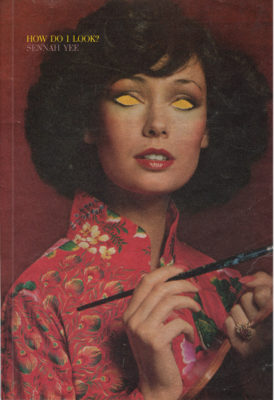
How Do I Look?
Sennah Yee
Metatron
$15.00
paper
84pp
9781988355085
Everyone loves older men and even older cities. But women must be girls, and preferably girls from out of town.
She is brilliant in “Texas Forever,” where she stuns with: “The billboards tell me that God and Jesus love me lots out here, but I’d never guess from everyone’s glares.”
A sense of playfulness coats her work, beneath which, critical racial issues lie – along with a touch of sadness, despair. Her raw, down-to-earth honesty delights. Her work is so full of juxtapositions, it hurts.
Hers is an important voice. And a very current one.
Sina Queyras’s My Ariel is a dense, high-level, sensitive, multi-part, gutsy collection. It gives the sense that every word is locked carefully into place; a controlled removal of all unnecessary ones following. Whatever is left is an impeccable fit, especially when it comes to her more formal poems.
In My Ariel, bodies and bruises abound. Queyras often addresses Sylvia Plath directly:
Notes are the best part of your journals, Sylvia, random
Accumulations: ball gowns, tiaras, squeezing Ted’s rosy mother,Holding a lovely droll baby, ideas, ideas, girl fights for
Freedom and integrity. Say it in a novella if not a poem.
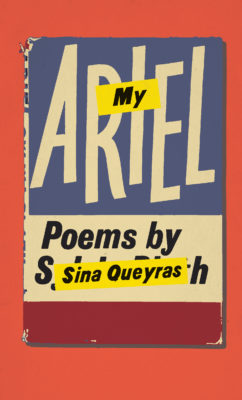
My Ariel
Sina Queyras
Coach House Books
$19.95
paper
88pp
9781552453544
Solitude pervades, as Queyras strips her soul: “I give you my worst and still I am alone.” And give, she does. It’s also about violence: violence between mother and child. Suicidal thoughts. Killings of various kinds.
The collection is so rich and so heroic, I cannot do it justice in so short a word count. Readers will need to spend a lot of time with it. Rest assured that the time will be very well spent.
Jay Ritchie’s collection Cheer Up, Jay Ritchie is a striking, at times comical ode to contemporary disillusion of thought and poetic form. The beautiful bonus: it all happens right here, in Montreal.
His book is like that contemporary art exhibit you walk into and wonder what connects Allen Ginsberg to a detective in cop clothes, to a dad’s SUV. It’s also one of those must-see exhibits art critics rave about: be ready to hop from one frame to the next – as you would in an art space.
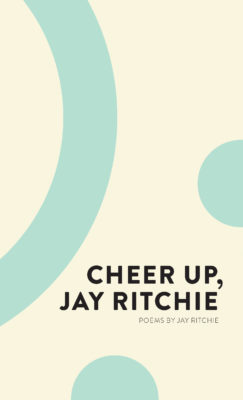
Cheer Up, Jay Ritchie
Jay Ritchie
Coach House Books
$19.95
paper
88pp
9781552453537
Ritchie is best when his twists hit us with aha moments:
One thing death and winning
the lottery have in common
is suddenness
The collection is filled with such round-offs, which often cheer up and surprise the reader.
“Multi-Level Marketing” is branded Ritchie, but with more multi-faceted acrobatics – it’s one of the strongest in the collection. And then he does this, and you give him a 10/10 on that handspring:
Some horror leaks in
when we reach the seabed of intimacy,
then it drops again cunningly
into your plastic jewellry.
Cheer Up, Jay Ritchie reads effortless, yet jolts our vision of what words – when thrown into stirring somersaults – can do. Looking forward to reading more of Ritchie. mRb






0 Comments